External links
- The Screwtape Letters title listing at the Internet Speculative Fiction Database
Screwtape appears as a fictional demon in The Screwtape Letters (first published in The Guardian 1941, collected and published in book form 1942) and in its sequel short story Screwtape Proposes a Toast (1959), both written by the Christian author C. S. Lewis. Screwtape is also the title of the stage adaptation of the Letters by James Forsyth (originally Dear Wormwood, 1961).
Screwtape holds the rank of Senior Tempter and serves as the Undersecretary of his department in what Lewis envisages as a sort of infernal Civil Service. The Screwtape Letters represent his side of the correspondence with his nephew Wormwood, as mentor to the young demon who is charged with the guidance of one man. He has a secretary called Toadpipe. The Toast is Screwtape's after-dinner speech at the Tempters' Training College and satirises American and British or English public education.
Screwtape appears to understand very well the nature of human minds and human weaknesses, although nothing about human love. He also has a way with words and a fondness for sarcasm.
Clive Staples Lewis was a British writer, literary scholar, and Anglican lay theologian. He held academic positions in English literature at both Magdalen College, Oxford (1925–1954), and Magdalene College, Cambridge (1954–1963). He is best known as the author of The Chronicles of Narnia, but he is also noted for his other works of fiction, such as The Screwtape Letters and The Space Trilogy, and for his non-fiction Christian apologetics, including Mere Christianity, Miracles, and The Problem of Pain.

A demon is a malevolent supernatural entity. Historically, belief in demons, or stories about demons, occurs in religion, occultism, literature, fiction, mythology, and folklore; as well as in media such as comics, video games, movies, and television series.
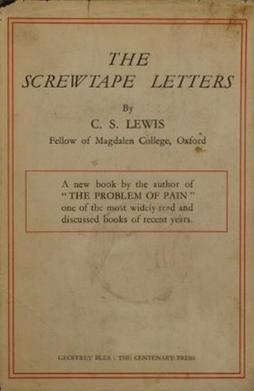
The Screwtape Letters is a Christian apologetic novel by C. S. Lewis and dedicated to J. R. R. Tolkien. It is written in a satirical, epistolary style and, while it is fictional in format, the plot and characters are used to address Christian theological issues, primarily those to do with temptation and resistance to it.
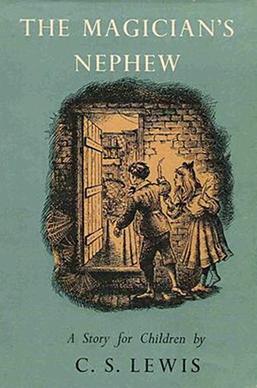
The Magician's Nephew is a portal fantasy children's novel by C. S. Lewis, published in 1955 by The Bodley Head. It is the sixth published of seven novels in The Chronicles of Narnia (1950–1956). In recent editions, which sequence the books according to Narnia history, it is volume one of the series. Like the others, it was illustrated by Pauline Baynes whose work has been retained in many later editions. The Bodley Head was a new publisher for The Chronicles, a change from Geoffrey Bles who had published the previous five novels.
Wormwood may refer to:

That Hideous Strength: A Modern Fairy-Tale for Grown-Ups is a 1945 novel by C. S. Lewis, the final book in Lewis's theological science fiction Space Trilogy. The events of this novel follow those of Out of the Silent Planet and Perelandra and once again feature the philologist Elwin Ransom. Yet unlike the principal events of those two novels, the story takes place on Earth rather than elsewhere in the Solar System. The story involves an ostensibly scientific institute, the N.I.C.E., which is a front for sinister supernatural forces.

There have been various attempts at the classification of demons within the contexts of classical mythology, demonology, occultism, and Renaissance magic. These classifications may be for purposes of traditional medicine, exorcisms, ceremonial magic, witch-hunts, lessons in morality, folklore, religious ritual, or combinations thereof. Classifications might be according to astrological connections, elemental forms, noble titles, or parallels to the angelic hierarchy; or by association with particular sins, diseases, and other calamities; or by what angel or saint opposes them.
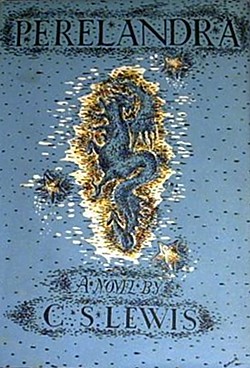
Perelandra is the second book in the Space Trilogy of C. S. Lewis, set on the planet of Perelandra, or Venus. It was first published in 1943.
The Space Trilogy is a series of science fiction novels by C. S. Lewis. The trilogy consists of Out of the Silent Planet (1938), Perelandra (1943), and That Hideous Strength (1945). A philologist named Elwin Ransom is the protagonist of the first two novels and an important character in the third.
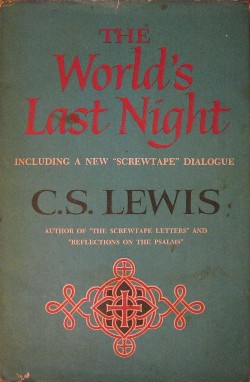
The World's Last Night and Other Essays is a collection of essays by C. S. Lewis published in the United States in 1960. The title essay is about the Second Coming of Jesus Christ. The volume also contains a follow-up to Lewis' 1942 novel The Screwtape Letters in the form of "Screwtape Proposes a Toast." The second, fourth and fifth pieces were published in the U.K. in a volume called Screwtape Proposes a Toast and other pieces (1965); the first, sixth and seventh were published in the U.K. in Fern-seed and Elephants and other essays on Christianity (1975). All the pieces were later collected in the comprehensive Essay Collection and Other Short Pieces (2000).

Laura Michelle Kelly is an English actress and singer, best known for originating the roles of Mary Poppins in Mary Poppins in the West End, for which she received the Olivier Award for Best Actress in a Musical, and Sylvia Llewelyn Davies in Finding Neverland on Broadway.

Manente degli Uberti, known as Farinata degli Uberti, was an Italian aristocrat and military leader of the Ghibelline faction in Florence. He was considered to be a heretic by some of his contemporaries, including Dante Alighieri, who mentioned Farinata in his Inferno.
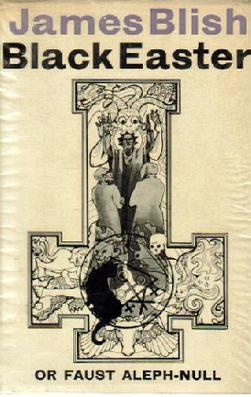
Black Easter is a fantasy novel by American writer James Blish, in which an arms dealer hires a black magician to unleash all the demons of Hell on Earth for a single day. The novel initially depicts the assassination of a Governor of California by a black magician working as a contract killer. The same magician is then hired to release every demon in Hell for a brief time period. However, the demons can not actually return to Hell by the end of the novel. Their traditional opponent, God, has already died and nobody else can compel them to return to Hell.

Letters from Hell is a didactic Christian novel by the Danish priest and author Valdemar Adolph Thisted (1815–1887), The work was published in Copenhagen in 1866 and went through 12 editions in its first year.
This is a list of writings by C. S. Lewis.

Max McLean is a Panamanian-born American stage actor, writer, and producer. He is the founder and artistic director of the Fellowship for Performing Arts, a New York City-based company that produces live theater and film from a Christian worldview.
Robert Hugh Carvel is a British film and theatre actor. He has twice won a Laurence Olivier Award: for Best Actor in a Leading Role in a Musical for his role as Miss Trunchbull in Matilda the Musical, and for Best Actor in a Supporting Role for his performance as Rupert Murdoch in Ink. For the latter role, he won the Tony Award for Best Actor in a Featured Role in a Play.

The Oh Hellos are an American indie folk rock duo formed in 2011 in San Marcos, Texas, consisting of siblings Tyler and Maggie Heath. They remain an independent band, with eight releases: The Oh Hellos;Through the Deep, Dark Valley;Dear Wormwood;Notos;Eurus;Boreas; and Zephyrus; as well as a Christmas EP: The Oh Hellos' Family Christmas Album. The duo initially found success on the music promotion website Bandcamp, and its music was later featured on NBC's Parenthood.
Lowerarchy may refer to:

Dear Wormwood is the second album by American folk rock band The Oh Hellos, released October 16, 2015. It was written, produced, and performed primarily by siblings Tyler and Maggie Heath, with the exception of "Danse Macabre", which was composed by Camille Saint-Saëns in 1874. The mixing and mastering was done by Charlie Kramsky, with extra vocals being recorded by members of the ensemble that tours with the duo, including Matthew Hagerman and Joey Chance.